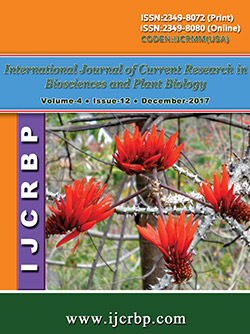 |
Online ISSN : 2349-8080 Issues : 12 per year Publisher : Excellent Publishers Email : editorinchiefijcrbp@gmail.com |
2Federal College of Education (Technical), Umunze, in affiliation with Nnamdi Azikiwe University, Awka. Anambra State, Nigeria
Glyphosate herbicide is among the most commonly used herbicide globally. Despite their value to agriculture, they posed direct or indirect threats not only to human health but also to beneficial organisms in the delicate web of nature. The soil samples were collected randomly from selected plots located in three towns in Okpokwu LGA of Benue State during wet and dry seasons (July and November respectively). Each of experimental plots sample were randomly selected from three different locations and exposed to various concentrations of glyphosate herbicide in three treatments (in replicate) 0, 0.84, and 840 kg/ha and four sampling days (1, 3, 7 and 30). The impacts of glyphosate herbicide application on soil bacteria were observed using standard laboratory procedures. The result revealed that there were no significant differences among the mean number of bacteria isolated in Ugbokolo town with the different concentrations of glyphosate applied on day 1. The same trend was established for days 3, 7, and 30 respectively for the remaining two towns, Ogene and Opialu. The bacteria Acetobacter sp., Agrobacterium sp., Agromyces ramosus, Arthrobacter sp., Azotobacter sp., Bacillus sp., Clostridium sp., Pseudomonas sp. and Rhizobacter daucus were found in all the locations studied. However, Acinetobacter sp. was only found in Ogene and Opialu while Citrobacter sp. was only found in Ugbokolo and Opialu. Agrobacterium sp., Bacillus sp. and Pseudomonas sp. increased in all the locations with increased concentration of glyphosate application. The increase in the number of bacteria colonies were more in the month of November (dry season) than in the month of July (wet) in all the locations. The indiscriminate use of glyphosate herbicide by rural farmers is a common practice among rural settlers in Benue State; therefore, public understanding and knowledge of the recommended dosage of glyphosate herbicide is of utmost important.
